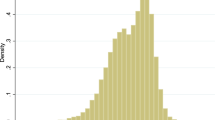Abstract
Quality education is an essential tool for students’ cognitive, intellectual, social, and personal development and to makes them responsible citizens of any nation. Identifying students’ strong and weaker intellectual skills and subject areas is essential for a continuous learning cycle and educational policymaking. So, to enhance the student's overall growth as an individual, we need to analyse and predict the students’ academic performance. This paper studies the impact of socioeconomic factors on students’ academic performance using Jawahar Navodaya Vidyalaya (JNV) case study. JNVs are the schools established to provide quality education to the unprivileged and rural students. We collected 257 students’ data from (JNV) Khunga Kothi, Jind, Haryana, India, of five successive batches to examine their academic achievements from admission in 6th to their passing 10th class. The results show that the students’ socioeconomic variables, such as caste, residence, and father occupation, impact their academic performance in the 6th class but cease to do so after five years of their residential study. Moreover, the female students performed significantly better than the male students. Furthermore, we observed the difference in the students’ performance from admission to five years. The results indicate improvement in performance and a strong correlation between the 6th and 10th class marks. Therefore, we proposed a regression model that predicts the students’ performance to help the students at an early stage. Observations also suggest that delivering better learning opportunities to the students belonging to the unprivileged classes can improve their academic performance.
Access this chapter
Tax calculation will be finalised at checkout
Purchases are for personal use only
Similar content being viewed by others
References
National Policy on Education (1986). http://psscive.ac.in/assets/documents/Policy_1986_eng.pdf
Brese, F., Mirazchiyski, P.: Measuring Students’ Family Background in Large-scale Education Studies. IERI (2013)
Considine, G., Zappalà, G.: The influence of social and economic disadvantage in the academic performance of school students in Australia. J. Sociol. 38, 129–148 (2002)
Sirin, S.R.: Socioeconomic status and academic achievement: a meta-analytic review of research. Rev. Educ. Res. 75, 417–453 (2005)
Broer, M., Bai, Y., Fonseca, F.: A review of the literature on socioeconomic status and educational achievement. In: Socioeconomic Inequality and Educational Outcomes. IRE, vol. 5, pp. 7–17. Springer, Cham (2019). https://doi.org/10.1007/978-3-030-11991-1_2
Humble, S., Dixon, P.: The effects of schooling, family and poverty on children’s attainment, potential and confidence—evidence from Kinondoni, Dar es Salaam. Tanzania. Int. J. Educ. Res. 83, 94–106 (2017)
Li, Z., Qiu, Z.: How does family background affect children’s educational achievement? Evidence from contemporary China. J. Chinese Sociol. 5(1), 1–21 (2018). https://doi.org/10.1186/s40711-018-0083-8
Paul, J., Jefferson, F.: A comparative analysis of student performance in an online vs. face-to-face environmental science course from 2009 to 2016. Front. Comput. Sci. 1, 7 (2019). https://doi.org/10.3389/fcomp.2019.00007
Singh, R., Choudhary, S.: An empirical study on the predictive role of SES on high school students’ achievement in learning ESL. Int. J. Learn. Chang. 10, 163 (2018). https://doi.org/10.1504/IJLC.2018.090925
Thomson, S.: Achievement at school and socioeconomic background—an educational perspective. npj Sci. Learn. 3(1), 1–2 (2018). https://doi.org/10.1038/s41539-018-0022-0
Atkinson, R., Geiser, S.: Reflections on a century of college admissions tests. Educ. Res. 38, 665–676 (2009). https://doi.org/10.3102/0013189X09351981
Bowers, A.J.: What’s in a grade? The multidimensional nature of what teacher-assigned grades assess in high school. Educ. Res. Eval. 17, 141–159 (2011). https://doi.org/10.1080/13803611.2011.597112
Khan, A., Ghosh, S.K.: Student performance analysis and prediction in classroom learning: a review of educational data mining studies. Educ. Inf. Technol. 26(1), 205–240 (2020). https://doi.org/10.1007/s10639-020-10230-3
Centra, J.A.: Will teachers receive higher student evaluations by giving higher grades and less course work? Res. High. Educ. 44, 495–518 (2003). https://doi.org/10.1023/A:1025492407752
Li, K.F., Rusk, D., Song, F.: Predicting student academic performance. In: Proceedings - 2013 7th International Conference on Complex, Intelligent, and Software Intensive Systems, CISIS 2013, July 1 (2013). https://doi.org/10.1109/CISIS.2013.15
Adjei, S.A., Botelho, A.F., Heffernan, N.T.: Predicting student performance on post-requisite skills using prerequisite skill data: an alternative method for refining prerequisite skill structures. In: Proceedings of the Sixth International Conference on Learning Analytics & Knowledge, pp. 469–473. Association for Computing Machinery, New York, NY, USA (2016). https://doi.org/10.1145/2883851.2883867
Backenköhler, M., Wolf, V.: Student performance prediction and optimal course selection: an MDP approach. In: Cerone, A., Roveri, M. (eds.) SEFM 2017. LNCS, vol. 10729, pp. 40–47. Springer, Cham (2018). https://doi.org/10.1007/978-3-319-74781-1_3
Kumar, A., Eldhose, K.K., Sridharan, R., Panicker, V.: Students’ academic performance prediction using regression: a case study. In: International Conference on System, Computation, Automation and Networking (ICSCAN), 3 July 2020. https://doi.org/10.1109/ICSCAN49426.2020.9262346
Hussain, S., Gaftandzhieva, S., Maniruzzaman, M., Doneva, R., Muhsin, Z.F.: Regression analysis of student academic performance using deep learning. Educ. Inf. Technol. 26(1), 783–798 (2020). https://doi.org/10.1007/s10639-020-10241-0
Author information
Authors and Affiliations
Editor information
Editors and Affiliations
Rights and permissions
Copyright information
© 2022 The Author(s), under exclusive license to Springer Nature Switzerland AG
About this paper
Cite this paper
Devi, K., Ratnoo, S., Bajaj, A. (2022). Impact of Socio-Economic Factors on Students’ Academic Performance: A Case Study of Jawahar Navodaya Vidyalaya. In: Abraham, A., et al. Innovations in Bio-Inspired Computing and Applications. IBICA 2021. Lecture Notes in Networks and Systems, vol 419. Springer, Cham. https://doi.org/10.1007/978-3-030-96299-9_73
Download citation
DOI: https://doi.org/10.1007/978-3-030-96299-9_73
Published:
Publisher Name: Springer, Cham
Print ISBN: 978-3-030-96298-2
Online ISBN: 978-3-030-96299-9
eBook Packages: Intelligent Technologies and RoboticsIntelligent Technologies and Robotics (R0)



